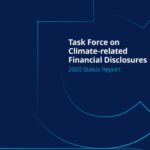
The Task Force on Climate-related Financial Disclosures (TCFD) announced yesterday that it has officially reached more than 1,000 supporters globally for its recommendations, signifying a major shift among market participants in acknowledging that climate change presents a financial risk. Together, the private sector organizations that are supporters have a market capitalization of nearly $12 trillion. The Task Force, which is chaired by Michael R. Bloomberg, provides recommendations to enable markets to address the financial impact of climate change by increasing transparency on climate-related risks and opportunities to promote more informed financial decision-making. By publicly declaring their support for the TCFD and its recommendations, the supporting organizations are demonstrating that they are taking action to build a more resilient financial system through climate-related disclosure.
“Reaching this important milestone for the TCFD shows that companies and global organizations are accepting that climate risk is financial risk. Today’s announcement also underscores the significant investor demand for information that will help them mitigate potential risks and evaluate opportunities in the transition to the low-carbon economy,” said Mary Schapiro, Head of the TCFD Secretariat. “This continued momentum and support from the public and private sectors is critical as we focus our efforts on implementation of the TCFD recommendations.”
“Only two years after the final TCFD recommendations were published, demand for climate-related financial
disclosures has skyrocketed and the supply is responding,” said Mark Carney, Governor of the Bank of England. “The TCFD is helping to bring climate risks and resilience into the heart of financial decision-making, making climate disclosure more comprehensive and comparable and helping investment for a two-degree world go mainstream. In this year of climate action, let’s build on this momentum to improve the quality and quantity of disclosure and build a market in the transition to net zero.”
The 1,027 supporters, which are headquartered in 55 countries, span the public and private sectors and include organizations such as corporations, national governments (Belgium, Canada, Chile, France, Japan, Sweden and the United Kingdom), government ministries, central banks, regulators, stock exchanges and credit rating agencies. Included among the supporters are 473 financial firms responsible for assets of $138.8 trillion. Private sector supporters include asset managers, asset owners, banks, and companies in industries such as chemicals, energy, insurance, metals and mining, oil and gas, and transportation, among others.
“As we began witnessing a massive shift of capital toward sustainability, with ESG investment becoming mainstream, it becomes increasingly critical for corporates to disclose climate-related risks and opportunities. The TCFD disclosure framework would be mutually beneficial for corporates who seek long-term capital and investors who want to make informed decisions. GPIF published its first TCFD-aligned report of our $1.6 trillion global portfolio last year, and we also urge our asset managers to follow our pursuit by sharing their analysis of climate-related risk and opportunities of the portfolios they manage for us. It is necessary for all parties in our investment chain, from portfolio companies to asset managers, to support the TCFD so that asset owners like us can properly access our portfolio. I am convinced that the TCFD will continue to evolve as a major framework for such disclosure and strongly recommend all corporates to join,” said Hiro Mizuno, Executive Managing Director and Chief Investment Officer of GPIF.
Widespread implementation of the TCFD recommendations will provide investors, lenders, and insurance
underwriters with the information necessary to understand companies’ risks and opportunities from climate change. Further, disclosure in line with the recommendations helps global markets adjust appropriately to the effects of climate change. Companies can benefit from implementing the TCFD recommendations in several ways:
- Easier or better access to capital by increasing investors’ and lenders’ confidence that the company’s
climate-related risks are appropriately assessed and managed, - Better ability to meet existing disclosure requirements by reporting material information in financial filings,
- Increased awareness and understanding of climate-related risks and opportunities within the company
resulting in better risk management and more informed strategic planning, and - Proactively addressing investors’ demand for climate-related information in a framework that investors are increasingly asking for.
Companies and others can express their interest in supporting the TCFD recommendations via this online form. The full list of current organizations supporting the work of the Task Force is viewable here and supportive quotes are viewable here. Companies considering implementing the TCFD recommendations are encouraged to visit the TCFD Knowledge Hub to access more than 520 relevant resources, including case studies and an e-learning platform.



